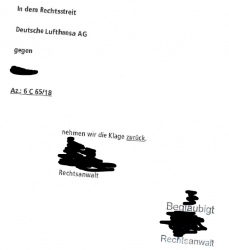Hi everyone
great to see, that this case even made it all around the world in the meantime. I am the passengers lawyer here in Germany and would like to give you some background information to better understand this case and the legal frameworkt.
We have a quite detailled legal framwork when it comes to terms & conditions in German law in sec. 305 ff of the German civil code (BGB).
Basically, as a consumer, everything that sounds "strange", is not legally binding.
We had presendet a full array of arguments under german law, of which every
single argument would have led to the dismissal of the action. The T&Cs in this points are not transparent enough (as they do not allow to show the expectable chargement), they do also cover cases in which it's not the passengers fault to miss a flight (e.g. delayed prior flight on same ticket, unfit to fly) and, my personal issue with this clause: Charging more for doing less.
In the oral hearing, the first instance judge at the local court of Berlin mentioned that this last point would not be a problem, which is quite surprising to me. We however were succesful due to the lack of transparency of the current T&Cs.
The German Federal Court (BGH) gave a ruling regarding cross-ticketing in a BA case back in 2010: Failing to use one of the segments of the flights entitles an airline to void the rest of the ticket and asking for a payment before letting the passenger fly as Airlines have a legitimate interest to protect their fare systems.
This decision had been mentioned repeatedly by Lufthansa. I do however think that these cases are not comparable:
Giving someone the option to pay to use the rest of a ticket is less than asking someone to pay for nothing.
One thing not really known in non-German-media yet: Even Lufthansa seems to be convinced that their T&Cs will not withstand a legal assessment: After the oral hearing, in which the judge already expressed her legal opinion, Lufthansa tried an abandonment of action.

After an oral hearing, the defendant has to approve this. My client did not approve the abandonment of action as he wanted to settle this case and LH would otherwise have had the chance to sue him again. I am therefore quite surprised that they filed an appeal to the next higher court (district court of Berlin).
As thousands of passengers every day are endangered of being retrocharged for unflown flights, this could even be a suitable case for an appeal that will be handled by the Federal Supreme Court of Germany (BGH).
In the meantime I heard about the European Commission examining the issue of hidden-city-ticketing, this might also solve the problem in the future.















